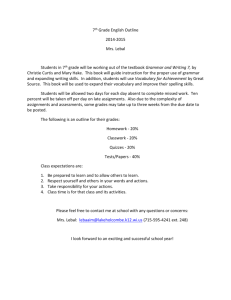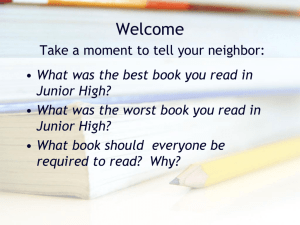7th-Grade-Literature-Syllabus
advertisement
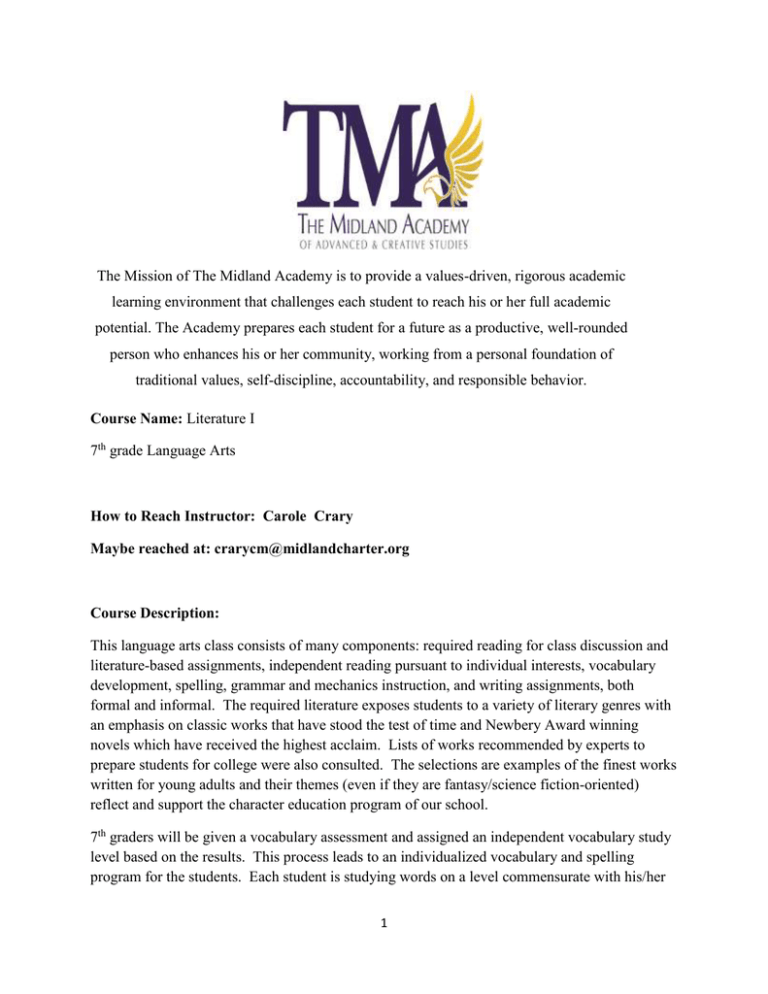
The Mission of The Midland Academy is to provide a values-driven, rigorous academic learning environment that challenges each student to reach his or her full academic potential. The Academy prepares each student for a future as a productive, well-rounded person who enhances his or her community, working from a personal foundation of traditional values, self-discipline, accountability, and responsible behavior. Course Name: Literature I 7th grade Language Arts How to Reach Instructor: Carole Crary Maybe reached at: crarycm@midlandcharter.org Course Description: This language arts class consists of many components: required reading for class discussion and literature-based assignments, independent reading pursuant to individual interests, vocabulary development, spelling, grammar and mechanics instruction, and writing assignments, both formal and informal. The required literature exposes students to a variety of literary genres with an emphasis on classic works that have stood the test of time and Newbery Award winning novels which have received the highest acclaim. Lists of works recommended by experts to prepare students for college were also consulted. The selections are examples of the finest works written for young adults and their themes (even if they are fantasy/science fiction-oriented) reflect and support the character education program of our school. 7th graders will be given a vocabulary assessment and assigned an independent vocabulary study level based on the results. This process leads to an individualized vocabulary and spelling program for the students. Each student is studying words on a level commensurate with his/her 1 ability and experience. Students learn 10 words per week by applying context clues, matching words with definitions, etc. The words have been selected because of their high frequency in our language and their usefulness in achieving the high level of reading comprehension necessary for the completion of high school and college level courses. 7th graders will have direct instruction in grammar and punctuation in the form of language exercises and unit tests which they will then have the opportunity to apply in their individual writing assignments. Formal writing assignments will include creative writing opportunities and practice in effective essay development. Specific purposes for essays will vary from expository to compare/contrast, and definition of abstract terms with an emphasis on persuasive argument. The most frequent type of writing assignments will be the literature-response essays that combine reading comprehension, higher level thinking skills, and literary analysis. Students will be expected to support their answers with specific evidence, quotations, and references to the texts. This is a skill required of all higher level English courses. Standards Taught: As an independent charter school with a rigorous academic focus, The Midland Academy offers an accelerated curriculum. We are a public school in Michigan; therefore we must abide by legislated curricular requirements. Curriculum taught is aligned with Common Core Standards, Michigan Grade Level Content Expectations, and District Standards. Subjects are taught with advanced and expanded content approach. Character Virtues: The Midland Academy provides a strong character education program designed with the three main components of moral development, etiquette and leadership. Just as our character is all encompassing, the main focus of this program is to incorporate a monthly virtue of study into all phases of academic curricula and school life activities outside the classroom. The following character virtues will be the focus for the 2014-2015 school year: humility, empathy, prudence, dependability, forgiveness, responsibility, respect, excellence, and cooperation. Required Texts/Materials: English and the novels listed in the Course Outline/Calendar. Instructional Methodology: The teaching philosophy adopted by The Midland Academy is dedicated to develop higher-order thinking skills for our students. Transformation of information and ideas is a key component of 2 higher-order thinking. This transformation occurs when students combine facts and ideas and synthesize, generalize, explain, and hypothesize or arrive at some conclusion or interpretation. Manipulating information and ideas through these processes allows students to solve problems, gain understanding and discover new meaning. In helping students become producers of knowledge, the teacher’s main instructional task is to create activities or environments that allow students opportunities to engage in higher-order thinking. The prominent educational psychologist, Benjamin Bloom developed a taxonomy of cognitive objectives in the 1950s which is a means of expressing different kinds of thinking. Bloom’s taxonomy provides a way to organize thinking skills into six levels, from the most basic to the higher-order levels of thinking. Bloom’s Taxonomy SYNTHESIS GENERATING NEW IDEAS, PRODUCTS OR WAYS OF VIEWING THINGS Designing, constructing, planning, , and inventing EVALUATION JUSTIFYING A DECISION OR COURSE OF ACTION Hypothesizing, critiquing, experimenting, and judging ANALYSIS BREAKING INFORMATION INTO PARTS TO EXPLORE UNDERSTANDING AND RELATIONSHIPS Comparing, organizing, deconstructing, and interrogating APPLICATION USING INFORMATION IN A FAMILIAR SITUATION Implementing, carrying out, using, and executing COMPREHENSION EXPLAINING IDEAS OR CONCEPTS Interpreting, summarizing, paraphrasing, and classifying 3 KNOWLEDGE RECALLING INFORMATION Recognizing, listing, describing, retrieving, and naming Higher level questions are those requiring complex application, analysis, evaluation or creation skills. Questions at higher levels of the taxonomy are usually most appropriate for encouraging students to think more deeply and critically, problem solving, encouraging discussions and stimulating students to seek information on their own. Differentiation: It is the philosophy of The Midland Academy that its curriculum must be diverse enough to meet the varied needs of able learners who have an exceptional thirst for learning. The content of the curriculum provides interest and challenge to all students, enabling them to reach their full potential. Course Policies: Attendance/Withdrawal: Refer to Upper School Parent Student Handbook. Grading System: Refer to Upper School Parent Student Handbook. Student-Led Conferences: Student-led conferences are held twice a year. The fall conferences are held in November and spring conferences are held in April. Students lead parents through work and reflection pieces that have been completed for school. This is a time for parents and students to discuss progress the student is making and set goals for the remainder of the year. If a more one-on-one discussion is needed between parents and teacher an appointment should be made for an alternate time. Parents are required to attend all conferences. Scholastic Dishonesty: 4 Refer to Upper School Parent Student Handbook. Grades will be based on the following: Spelling/Vocabulary/Grammar Tests 30% Homework/Independent Reading Assignments 20% Reading Comprehension and Literary Analysis Based Assignments including Formal Writing Projects 50% Course Outline/Calendar: Marking Period 1 The Hobbit by J. R. R. Tolkien 1) How do authors’ experiences influence their writing? 2) Differentiate between fantasy and science fiction genres. How do they stimulate creativity? 3) Analyze the many themes in sophisticated literary works. 4) Analyze character development techniques used by authors. The Giver by Lois Lowry and/or The White Mountains by John Christopher 1) How do authors use tone to comment on real life scenarios? 2) What is the difference between external and internal conflict? Plot resolution, climax, falling action? Grammar Unit 5 Punctuation and Capitalization 1) How do you indicate quotations within a quotation? 2) How do you use hyphens, dashes, and parentheses? Grammar Unit 1 The Sentence 1) Identify compound subjects, predicates, and compound sentences. 2) What are complex sentences? 3) How do you recognize and correct fragments and run-ons? Theme Analysis Essay 1) How do you identify themes in literature? Motifs? 5 2) How do you organize an essay effectively and support your opinions? Marking Period 2 A Christmas Carol or an abridged version of Great Expectations by Charles Dickens Pride and Prejudice by Jane Austen or The Dark Is Rising by Susan Cooper 1) What is Social Darwinism and how does Dickens argue against it? 2) How do authors act as social activists. 3) Analyze complex literary elements such as symbolism, metaphors, similes, allusions, mood, flashbacks, etc. Grammar Unit 2 Nouns 1) Differentiate between abstract and concrete nouns, collective and compound nouns. Grammar Unit 3 Verbs 1) How do we conjugate perfect tenses? 2) How we use progressive verb forms? Expository Essay Literary Response Essays Marking Period 3 Much Ado About Nothing by William Shakespeare The Prince and The Pauper by Mark Twain 1) How does literature reinforce and reflect values and belief systems? 2) Analyze literary elements providing examples from the text. Definition Essay Theme Essay Grammar Unit 4 Modifiers Unit 7 Prepositional Phrases 1) What are adverb phrases? Adjective phrases? 6 2) How do you place modifying phrases correctly? Marking Period 4 The Scarlet Pimpernel by Baroness Orczy Poetry or Selections from The Canterbury Tales by Geoffrey Chaucer 1) What is Romantic literature? 2) Identify and give examples of effective writing techniques. Persuasive Essay Grammar Unit 8 Complex Sentences 1) How do you write and analyze complex and compound complex sentences. Grammar Unit 6 Pronouns 1) How do you use reflexive, intensive, and indefinite pronouns? 7
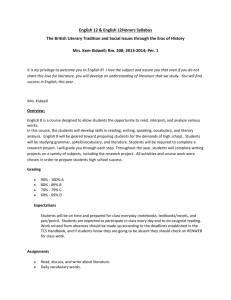

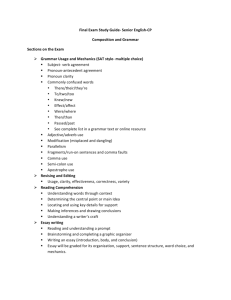
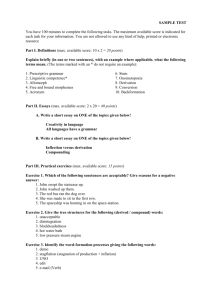
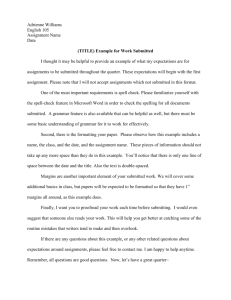
![Submission 68 [doc]](http://s3.studylib.net/store/data/008000926_1-fed8eecce2c352250fd5345b7293db49-300x300.png)

